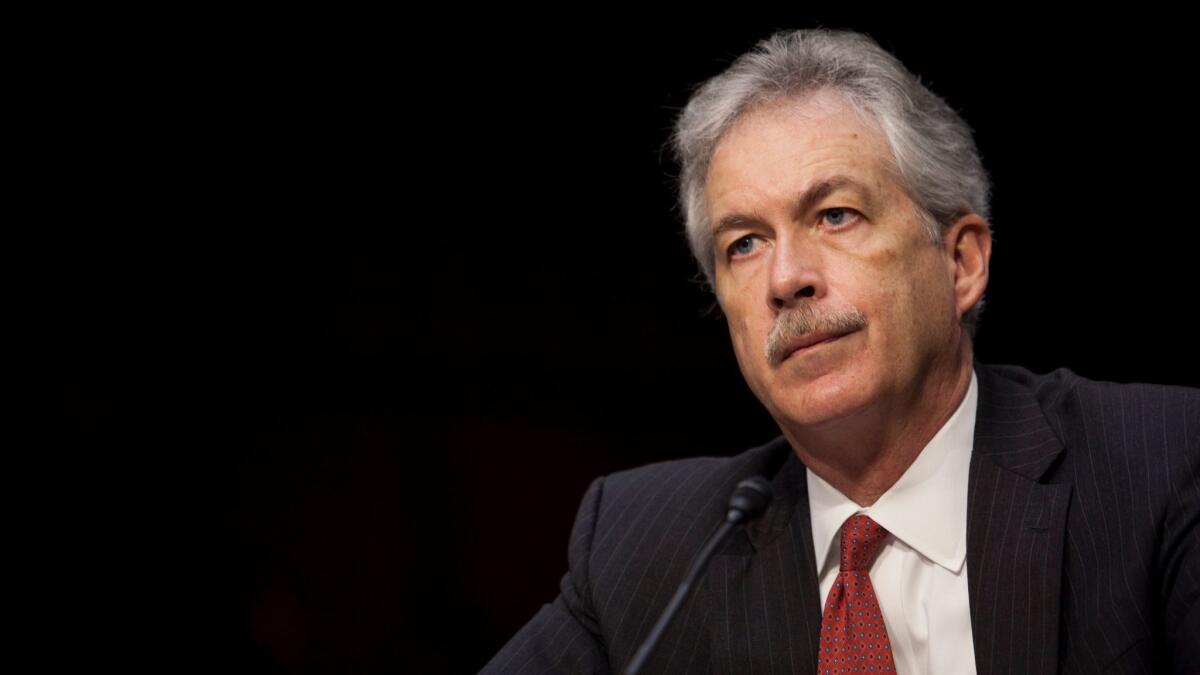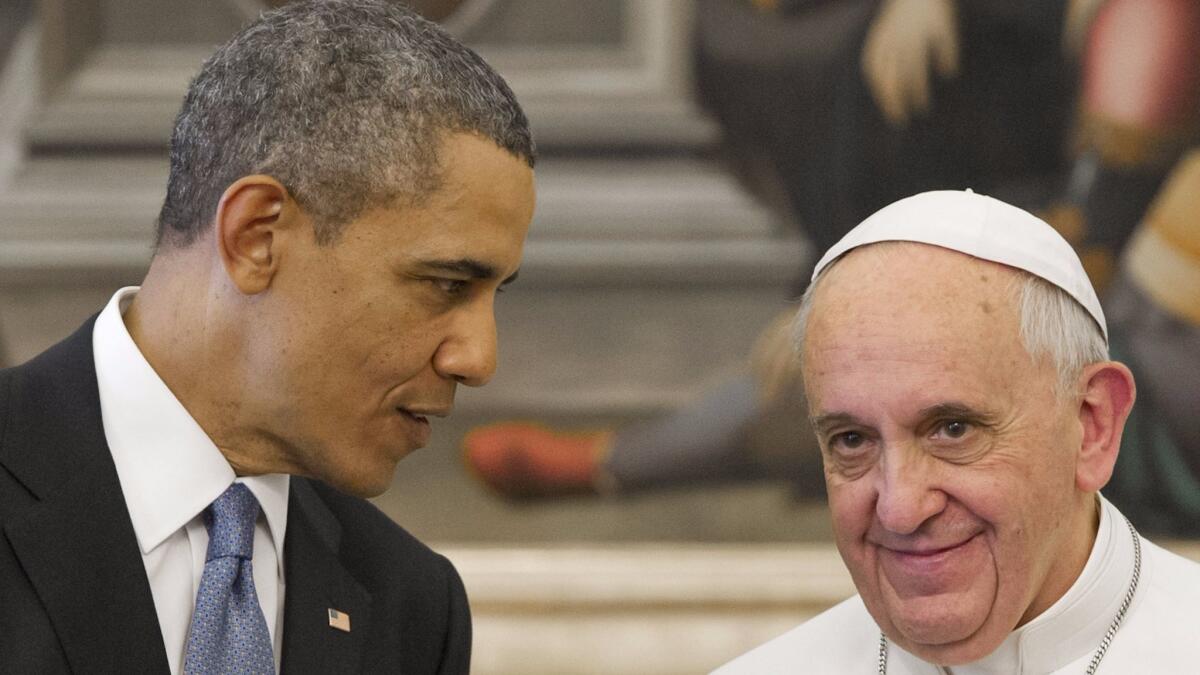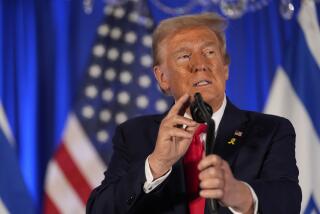Back channels between rivals have a long history, though none quite like the one Kushner purportedly sought
- Share via
Reports that President Trump’s son-in-law Jared Kushner was trying to establish a secret line of communication between the Trump transition team and Russian government officials have raised concerns among U.S. defense and intelligence experts. It remains unclear what his intent may have been, but Kushner is reportedly at the center of an investigation into possible ties between the Trump campaign and Moscow.
The White House has neither confirmed nor denied that Kushner made such an effort, but some of the president’s allies said the 36-year-old businessman would have been doing nothing wrong by trying to forge better relations with the Kremlin before Trump assumed office.
White House counselor Kellyanne Conway told Fox News that back-channel communications were “the regular course of business.”
She’s not entirely wrong.
It would be unusual to try to establish such a channel before the start of an administration, and it is unclear what its aim would have been in dealing with Russia. But throughout recent history, the United States and other nations have used private communications and secret negotiations to reach consensus and forge deals.
According to Safire’s Political Dictionary, a back channel is “a seemingly unofficial but direct method of high-level communication, bypassing the usual routes of messages through bureaucracies.” The communication is typically between adversaries, sensitive in nature and conducted through an intermediary.
Back channels have been used by various governments to negotiate peace deals, placate foes, secure the release of prisoners and save face.
Here are some notable examples:
Cuban missile crisis
In 1962, at the height of the Cold War, the U.S. and the Soviet Union approached the precipice of nuclear war over the Kremlin’s installation of ballistic missiles in Cuba. A 13-day standoff ensued as President Kennedy placed a naval blockade around Cuba and threatened to use military force. Neither nation wanted to be seen as backing down. The two sides exchanged many letters and other communications formally and through back channels, according to Revelations from the Russian Archives on the Library of Congress website.
On Oct. 27, 1962, Soviet Premier Nikita Khrushchev sent a message to Kennedy indicating that any proposed deal had to include the removal of U.S. missiles from Turkey, according the U.S. State Department’s Office of the Historian. That night, Kennedy sent Khrushchev his proposed steps for the removal of Moscow’s missiles from Cuba under supervision of the United Nations. He also guaranteed that the U.S. would not attack Cuba, according to the Office of the Historian.
Atty. Gen. Robert F. Kennedy then met secretly with Anatoly Dobrynin, Soviet ambassador to the U.S., and told him that Washington had already been planning to remove its missiles from Turkey and that this would occur soon but “could not be part of any public resolution of the missile crisis,” according to the Office of the Historian.
The next morning Khrushchev issued a public statement indicating Soviet missiles would be removed from Cuba, according the Office of the Historian. The U.S. removed its missiles from Turkey in April 1963.
Nixon and the Soviets
President Nixon used several back channels to communicate with the Soviet Union, starting in 1968 after winning the election that November and before his inauguration. He reportedly dispatched longtime aide Robert Ellsworth to relay his views on arms control and other issues to Dobrynin, the Soviet ambassador, and Soviet Charge d’Affaires Yuri Cherniakov.
In 1972, Nixon’s national security advisor, Henry Kissinger, “colluded with ... Dobrynin to keep the U.S. Secretary of State in the dark about ongoing secret discussions between the Soviets and the Nixon White House,” according to the National Security Archive at George Washington University.
Nixon’s back-door negotiations were successful in thawing hostilities between Washington and Moscow, leading to improvements in bilateral relations and formal agreements on arms control.
Obama and the Iran nuclear deal

Secret concessions paved the way for the Obama administration to seal a deal with Iran over its nuclear program.
Negotiations that had stumbled along for 12 years took an important step forward in 2012 after President Obama’s reelection. He dispatched William J. Burns, the deputy secretary of State, and Jacob Sullivan, chief foreign policy advisor to Secretary of State Hillary Clinton, to the port of Muscat, Oman, to open a back channel to Iran. These and subsequent secret talks helped lead to a multinational deal in 2015 in which Iran’s nuclear activities were restricted in return for the easing of sanctions against the Islamic Republic.
Normalization of relations with Cuba

Through back channels, Pope Francis played an instrumental role in helping to normalize relations between the U.S. and Cuba in 2014. The pope worked behind the scenes after Obama sought his help during a visit to the Vatican in March 2014. According to the Vatican, the pope wrote letters to Obama and Cuban President Raul Castro urging them to “resolve humanitarian questions of common interest.”
“The pope’s secret role in the back-channel talks was crucial because, as a religious leader with the confidence of both sides, he was able to convince the Obama and Castro administrations that the other side would live up to the deal,” The Times reported.
But according to the book “Back Channel to Cuba: The Hidden History of Negotiations between Washington and Havana,” by William M. LeoGrande and Peter Kornbluh, the U.S. was engaged in private negotiations with Cuba for five decades before Obama stepped in.
Working from declassified documents and other material dating to the Kennedy administration, the authors revealed “a series of secret meetings that took place in hotels, airport lounges and restaurants from New York to Paris to Guadalajara and involved intermediaries like the chairman of Coca-Cola, who served as President Jimmy Carter’s representative, to Carter himself,” according to a review by NPR.
Pursuing peace with militant groups
The British government had a back channel to negotiate with the Irish Republican Army beginning in 1972, according to Jonathan Powell, the British government’s chief negotiator in Northern Ireland from 1997 to 2007 and author of “Talking to Terrorists: How to End Armed Conflicts.”
In a recent op-ed in the New York Times, Powell said the back channel “played a crucial role in bringing about a cease-fire in 1975, the end of the first hunger strike in 1980 and, crucially, the 1994 cease-fire and peace talks under Prime Minister John Major,” who had once told the British Parliament that “it would turn his stomach” to talk to the IRA, Powell wrote.
In Spain, the government ran negotiations through an independent organization based in Switzerland to secretly talk with the Basque separatist movement that led to the end of that conflict in 2011, Powell wrote.
Intermediaries of the Colombian government met secretly with guerrilla fighters of the Revolutionary Armed Forces of Colombia (FARC) in the jungle to hold talks that led to peace last year, according to Powell.
India-Pakistan relations
In 2007, Indian Prime Minister Manmohan Singh and Pakistani President Pervez Musharraf reportedly used back channels to work out a draft framework agreement on the disputed region of Kashmir. The negotiations had reached an advanced level, and both countries were discussing signatures and announcements, according to Meenakshi Sood, a research scholar at Jawaharlal Nehru University in New Delhi, writing in the South Asia Monitor.
The talks were revealed by WikiLeaks, but details remain unclear, including why the agreement did not see the light of day.
For more on global development news, see our Global Development Watch page, and follow me @AMSimmons1 on Twitter
ALSO
The former FBI director will talk about his dealings with President Trump
Does President Trump’s ‘America first’ policy cede U.S. global authority?
Trump is poised to withdraw from Paris climate pact — unless he changes his mind
More to Read
Sign up for Essential California
The most important California stories and recommendations in your inbox every morning.
You may occasionally receive promotional content from the Los Angeles Times.











